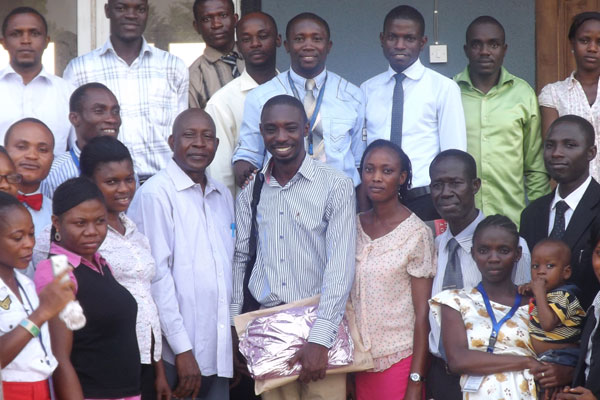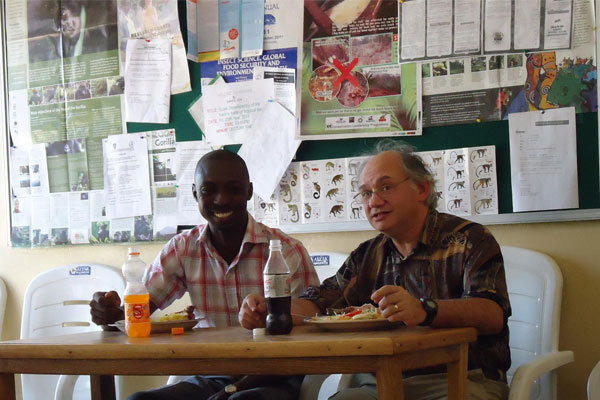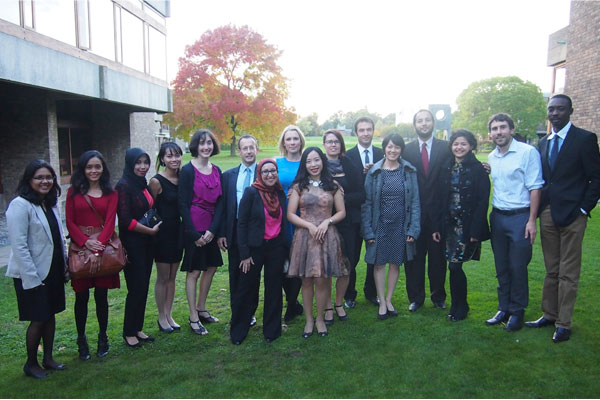Member Spotlight
|
A field course in the mountains of Usambara led Stephen Awoyemi to make conservation his purpose in life From SCB | Posted February 2014 |
 |
|
Stephen Awoyemi, center, at his farewell party at the Advanced Breed Comprehensive College in Sagamu, Nigeria where he taught biology & science from 2010 - 2013. --------------------------------------------------------------------------------------------------------------------------------------------------------------------- |
Stephen Awoyemi's passion for conservation was ignited in the Usambara Mountains in Tanzania in 2002 where he was participating in a field course sponsored by the Tropical Biology Association.
|
--------------- "SCB connotes deep meaning for me. This is where I found my voice, my alma mater in the school of conservation leadership experience." Stephen Awoyemi --------------- |
. |
The mountains are a biodiversity hotspot and it was there, engaged in on-the-ground conservation projects and learning about the scale of humanity's impact on the environment, that Stephen realized that conservation is the cause to which he would dedicate his career.
Since then he has "not turned back. Not even once."
Today Stephen is a Miriam Rothschild Scholar at the Conservation Leadership Program (MPhil) at the University of Cambridge in the United Kingdom.
In the following Q&A, Stephen, who is from Nigeria, offers advice to conservation biology students on how to make a difference and discusses leadership, the role of religion in conservation biology, and why he is pursuing a Master of Philosophy in conservation.
You are one of the founders of SCB's Religion and Conservation Biology Working Group. Most don't associate religion with conservation.What role does religion play in conservation?
Steven: If you observe trends you will find out that in the last 50 years humanity has increased tremendously in its capacity to self-determine and above all be responsible for its destiny and its planet. Irrespective of the shortfalls, there is a dawning, an awakening in humanity that we can change things, we are in control and therefore responsible.
This consciousness is also spreading across religious communities in different parts of the world. Religions have more strongly emphasized, refined and altered their teachings about conservation in ways that call for changing human behavior toward nature. This is a welcome development. We know that religion drives three behavioral pivots in the human: beliefs, emotions and values. Facts, figures and statistics do little to foster the commitment conservation badly needs. And religion can help us place meaning, value and concern for biodiversity in society where science cannot tread.
|
Stephen Awoyemi on leadership in conservation. ----------------------------------------------------------------------------------------------------------------------------------------- |
There are people in your program from literally all corners of the world. What have you learned from your classmates and what is it like to participate in group discussions where so many different cultures, experiences, perspectives and approaches are represented?
 |
|
Stephen with friend and colleague Andrew Gosler of Oxford University in Aplori Jos, Nigeria in 2011. --------------------------------------------------------------------------------------------------------------------------------------------------------------------- |
|
--------------- "Defining purpose is central to any aspiration. The conservation biology student must search within him or her to indentify their purpose." Stephen Awoyemi --------------- |
- Sustained “initiative” all through one’s life and career not just a flash in the pan demonstration.
- A heart of service, contribution and personal responsibility. In essence, a leader should consistently ask: how can I contribute? What is needed of my strengths and personality to make a difference in my organization, society and world?
- The leadership mind is an embodiment of love. Love for work, humanity, and biodiversity. Without love, service becomes mechanical, dull and ineffective.
- Lastly but not limited to these, the leadership mind is one that is self-aware. The reason why many cannot lead is because they have not found themselves; their identity; their voice.
 |
|
Stephen Awoyemi (right) with classmates at the Conservation Leadership Program (MPhil) at Cambridge in 2013. --------------------------------------------------------------------------------------------------------------------------------------------------------------------- |
Wildlife conservation is not considered a priority in Nigeria and many parts of Africa. I see religion as the most apt conduit to reach the hearts and minds of many Africans. The essence would be to enlighten and bring to their consciousness the importance of biodiversity and the African’s role in contributing to save life on Earth from an imminent catastrophe.
Stephen Awoyemi on the impact of SCB.